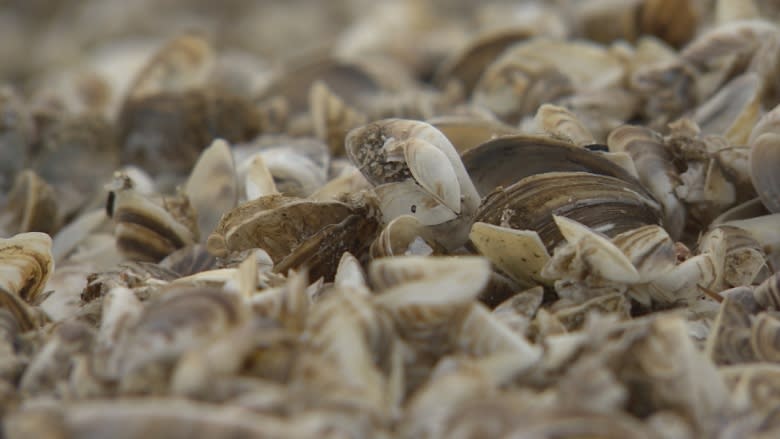Melting snow reveals millions of dead zebra mussels at Victoria Beach
The spring melt is a sight for sore eyes for most of us, but for some cottagers out in Victoria Beach it's come with an unpleasant smell: rotting zebra mussels.
The decaying remains of the invasive pests that washed up along the shores of Lake Winnipeg last fall are making their presence known as the snow disappears.
"There was millions of dead zebra mussels sitting around the rock and up floating on top of the snow, and they were just rank," said Victoria Beach resident Melissa Wilson.
Wilson was out for a walk on the ice last week and noticed the rocks that were poking through were covered in dead zebra mussels.
"I've never seen that before, I mean we saw lots of them the last year and a half — three years ago I didn't know what a zebra mussel was," she said.
Wilson, 34, has been coming to the area her entire life and moved there permanently a year and a half ago. She said over the past few years the problem has been getting worse.
"It's amazing that three years ago I didn't see one, and now [zebra mussels are] everywhere," said Wilson.
"It's just sad and depressing."
'New normal'
Zebra mussels were first detected in Lake Winnipeg in the fall of 2013. They were also found in the Red River and Cedar Lake in 2015, according to the Manitoba government.
The province has taken numerous steps to try and contain the problem and keep them from spreading, but experts say they are here to stay.
"It's a bad problem, I'd say zebra mussels are the poster child I guess when it comes to aquatic invasive species," said provincial aquatic invasive species specialist Candace Parks.
"Manitobans have been in the past very fortunate not to deal with this issue, but now unfortunately they are here and now we people need to realize the steps they need to take to not spread this to other water bodies," she said.
Parks says people living along the south basin of Lake Winnipeg can expect the mussels to wash up on the shores from time to time; the pests live under water and attach themselves to rocks or structures, but can become dislodged.
"When we have a wind event they will dislodge and be put back onto the beach and that's where people are now seeing them," said Parks.
"People are still going to be able to boat, go swimming, go fishing, it's just sort of the new normal I guess, we now need to live with zebra mussels in Lake Winnipeg," she said.
Parks says the best thing people who use the lake can do is prevent the spread of zebra mussels to other bodies of water.
Water-goers are encouraged to clean, drain, dry, and dispose of anything that could spread the mussels.
Parks says boats — and other watercrafts like canoes or kayaks — are the most obvious carrier, and it's the law to take precautions.
But she says there are other culprits that people don't often think of.
"It could be a paddle, your PFD [personal floatation device], but also your kid's sand pail, anything that's used in water," she said.
Shells cut bare feet
Parks says it's not known if the zebra mussels will continue to multiply at the same rate as the past few years or if a peak will be reached at some point.
"They are loving Lake Winnipeg unfortunately, so they're here to stay and they are multiplying but we don't know if they are going to continue to multiply," she said.
Wilson says it does put a damper on summer fun at the lake because the shells are sharp and can easily cause cuts and scrapes for swimmers.
She says a popular diving spot, the pier, was covered with mussels last summer.
"There was billions coating the pier, so when my kids were climbing the ladder they were cutting their feet," she said.
"This summer we actually have to go buy water shoes which is something that we've never done."
She said even if you stay out of the water, where the mussels attach to the rocks, the dead ones wash up on shore, creating a crunchy, smelly mess.
"They're really tiny, like they're the size of your pinky nail, some are smaller so they just stir right into the sand," she said.
Wilson worries the problem could cause property values to fall in the future.
"It's going to affect my kids, or if I decided to sell," she said.
"People that are living down here. Their properties are not going to be worth nearly as much because the lake is just going to heck right now," said Wilson.
Wilson says the mussels are just part of a bigger problem with the health of the lake — erosion and blue-green algae are also big problems.
"Some property owners have already lost 30 feet of their backyard and now they've got zebra mussels washing up," she said.
"We're just going to have to live with it."
"I don't know what the long-term effects are going to be, I know that the entire ecosystem is thrown off."



